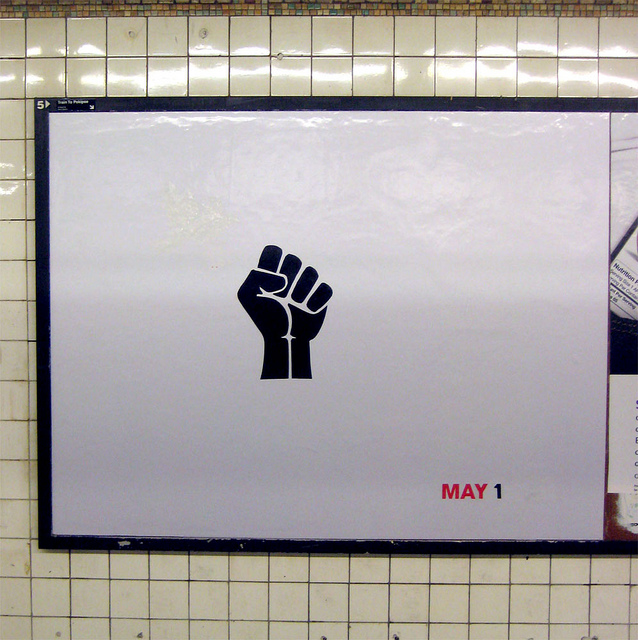It's May Day, and Protesters Are out in Force Opposing Trump
By:
While May Day, also known as International Worker's Day, has not always been a particularly prominent day of protest in the United States—as opposed to European countries—this year's protests illuminated a renewed spirit of organizing around the event, with protesters drawing direct connections between Trump's crackdown on immigrants and the importance of organized labor.
Wait, what's May Day?
The celebration of May Day is actually a tradition that dates back thousands of years, originally to commemorate the return of spring. According to the Atlanta Journal Constitution, "Floralia, or the festival of Flora the Roman goddess of flowers, was held in ancient Rome on April 27 and is believed to be the first May Day-type celebration on record." The festival also included dancing around a maypole—a long pole with strings tied to the top. But it wasn't until the later part of the 19th century, that May Day events became synonymous with worker's rights.
 LiquidCrash - flickr.com
LiquidCrash - flickr.com
Why May 1st?
As Time noted, the date marks the anniversary of a planned nationwide strike of 200,000 U. S. workmen in 1886. One of the major centers of strike was Chicago, where workers at the McCormick Reaper plant demonstrated in demand of an eight-hour workday. On the fourth day of action, a peaceful gathering at the nearby Haymarket Square turned violent when a bomb exploded, killing eight police officers. The police then opened fire on the crowd, killing several people, and wounding over 200.
The incident sparked a "national wave of xenophobia, as hundreds of foreign-born radicals and labor leaders were rounded up in Chicago and elsewhere," according to The History Channel. Eight of the organizers of the protest were sentenced to death in connection with the bombing. Four were executed, one committed suicide, and three were eventually pardoned in 1893. It is thought by many that the convicted organizers had nothing to do with the bombing, which made their sentencing and subsequent martyrdom a galvanizing force for the labor movement.
 Poster Boy - flickr.com
Poster Boy - flickr.com
May Day in the Era of Trump
This year's planned events were expected to have much larger crowds than usual. As NPR reported before the day's action, "in cities from Washington, D.C. to Los Angeles to Seattle, the more traditional May Day labor marches are expected to swell with women's groups, police reformers — basically anyone who wants to protest the president."
The protests were particularly pointed, highlighting the new administration's policies on immigration as a labor issue. As NPR reported, the day's rallies were marked by a spirit of "celebrating labor, calling for greater protections and benefits for workers and highlighting the contributions of immigrants."
For his part, Trump invoked the presidential tradition of celebrating "Loyalty Day" on May 1—a practice which dates back to the Eisenhower era—and said the day would serve as a chance to "recognize and reaffirm our allegiance to the principles of America's founding."
